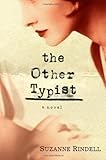 New York City, 1924: the Volstead Act has spawned a thriving bootlegging industry, jazz throbs from secret speakeasies, the hemlines are scandalous, and girls are bobbing their hair. The world has changed so rapidly that even some of the young are disoriented. Rose, Suzanne Rindell’s narrator, is a straitlaced young woman who was raised by nuns. She views the excesses of the jazz age from afar and with some suspicion. Rose understands that some people have the luxury of risking the wild freedoms of this new era, and others don’t. She has an orphan’s understanding of the precariousness of her place in the world. She follows the rules.
New York City, 1924: the Volstead Act has spawned a thriving bootlegging industry, jazz throbs from secret speakeasies, the hemlines are scandalous, and girls are bobbing their hair. The world has changed so rapidly that even some of the young are disoriented. Rose, Suzanne Rindell’s narrator, is a straitlaced young woman who was raised by nuns. She views the excesses of the jazz age from afar and with some suspicion. Rose understands that some people have the luxury of risking the wild freedoms of this new era, and others don’t. She has an orphan’s understanding of the precariousness of her place in the world. She follows the rules.
In early adulthood, she’s built a respectable life for herself: she’s employed as a typist at a police station in the Lower East Side of Manhattan, where she sits in on confessions and types up reports, and goes home in the evenings to a boarding house. She is extraordinarily competent in her work — 160 WPM on a manual typewriter? Okay, fine, it’s fiction — and cautious in her day-to-day life.
The other typist is Odalie. When she appears for a job interview at the station, she exerts a magnetic pull on the others; Rose is mesmerized, as is the sergeant, the lieutenant detective, and everyone else. “There was an excitement in the air around her,” Rindell writes, “an excitement that might include you in some way, as though you were her secret collaborator.”
Rose is wary of “modern girls” like Odalie, with their bob haircuts and their casual entitlement, their way of moving through the city as if the city existed for their amusement. The Other Typist is a chronicle of a woman’s unraveling, but it’s also a subtle examination of economic privilege. The rapidly loosening mores of that time looked like freedom, but the level of risk that comes with freedom is never, of course, the same for everyone. Everyone who frequented the speakeasies of 1920s New York was taking a risk, but some had a net to catch them if they fell, and others didn’t. Rose’s impression that the new era isn’t for people like her doesn’t seem unwarranted.
But for all of Rose’s love of the rules, she has a certain weakness. She introduces herself as an orphan, but technically she isn’t, or at least she wasn’t when she was dropped off at the orphanage as an infant. Rose wasn’t orphaned, she was abandoned by her family, and Rindell expertly suggests the subtle vulnerability that lingers in her as a result. Odalie is a con artist, but in order for a con to work, the dupe has to want to believe. When Odalie turns the full force of her charms on Rose and eventually invites Rose to move in with her, Rose is flattered and grateful enough to ignore her doubts. By the time Rose discovers Odalie’s true business and what she’s doing working at the police station, it’s too late. She is enmeshed, for precisely the same reason that no one thought to ask why a woman of such obvious means as Odalie required employment as a typist in the first place: “I can only say we are all susceptible to blind spots when exposed to the right dazzling flash.”
Given the era, it’s impossible to avoid comparisons between Odalie and Jay Gatsby. Odalie is magnetic, charming, mysteriously wealthy, and engaged in shady business practices. There’s even a climactic party on Long Island. But if anything, Odalie is Gatsby’s mirror image; the trick of Fitzgerald’s character was that while Gatsby was obviously a fraud — James Gatz of North Dakota — he was in some essential sense a better and truer man than the careless and frivolous and perfectly respectable people who used their own names and their own unembellished backstories as they flitted through his life. Odalie is much darker. It isn’t that her charm and beauty and mysterious wealth conceals any malice; in order to feel malice, a person has to care.
There’s a certain amount of unnecessary exposition in the first half of the book, and the novel is hampered at times by a weakness for excessive foreshadowing; in the early chapters especially, there are a great many of those “but little did I know what would come next” asides that do little to move a story forward and that can even suggest a certain — in this case entirely unwarranted — insecurity on the part of the writer. But Rindell is a fine writer, and she’s written a suspenseful and well-executed novel. The Other Typist is an elegant debut.








